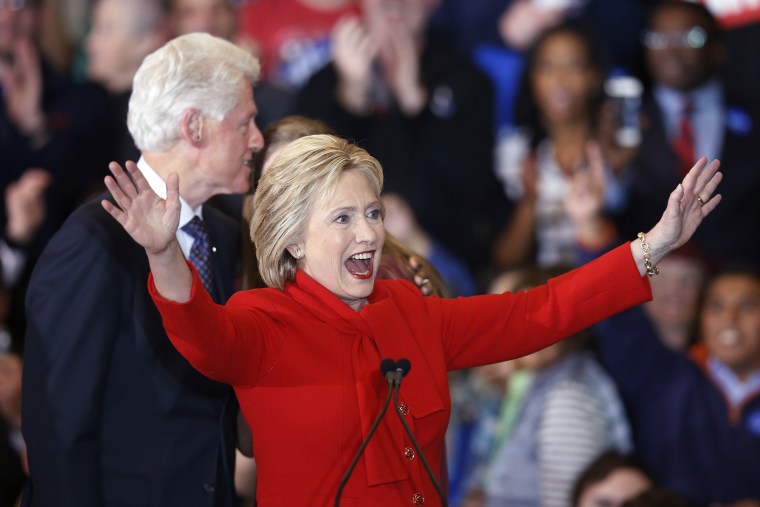For Democrats, the results of the Iowa caucuses are usually quite clear. The closest-ever contest was in 1988, when two Midwesterners battled it out -- Missouri's Dick Gephardt beat Illinois' Paul Simon by four points -- but Iowa Dems have otherwise known fairly early on caucus night who prevailed.
Last night, however, was a very different story.
The Democratic battle in Iowa was so close that both Vermont Sen. Bernie Sanders -- the 74-year-old socialist with no major endorsements -- and Hillary Clinton left the state without a clear-cut victory. [...] Aboard a charter jet bound for New Hampshire, Clinton Press Secretary Brian Fallon told reporters that "we believe strongly that we won.... It's not clear post-Iowa what Senator Sanders' path to victory is," Fallon added.
That appears to be true. At 3:35 a.m. ET, the Clinton campaign's Iowa state director issued a statement declaring victory. "After thorough reporting -- and analysis -- of results, there is no uncertainty and Secretary Clinton has clearly won the most national and state delegates. Statistically, there is no outstanding information that could change the results and no way that Senator Sanders can overcome Secretary Clinton's advantage."
About a half-hour later, NBC News reached a similar conclusion and declared Clinton the "apparent" winner. As things stand, the former Secretary of State has 49.9% of the vote to Sanders' 49.6%.
Given the margin, it doesn't come as too big of a surprise that the Vermont independent has not conceded the contest, and it's not yet clear whether the Sanders campaign will formally challenge the results.
But for the sake of conversation, and without any tangible evidence that points to a likely change of outcome, let's go ahead and consider the looming What It All Means question.
As is often the case when it comes to political analysis of Hillary Clinton, the (apparent) Iowa win looks very different to different people. For those sympathetic to the Democratic frontrunner, last night was a hard-fought triumph in a state that rejected her eight years ago. For many pundits and Republicans, the fact that she had a close race against a socialist senator is evidence of "weakness."
Your mileage may vary.
What seems less debatable is that Sanders needed a win in Iowa to change the Democratic race at a fundamental level.
As we discussed a few weeks ago, FiveThirtyEight's Nate Silver published a piece back in July noting that Sanders is strongest in states where the universe of Democratic voters is very white and very liberal. Based on previous performance, that means the three best states in the Union for the senator are, in order, Vermont, New Hampshire, and Iowa.
In other words, Iowa was a natural for Sanders. His message was poised to land on fertile soil.
The Vermonter believed he could take full advantage of the beneficial calendar -- given its demographics, the fact that Iowa and New Hampshire go first was the equivalent of Sanders pulling an inside straight -- and win both of the first two nominating contests, becoming only the third Democrat to do so, following Al Gore and John Kerry.
At that point, the theory went, the Democratic establishment would enter a full-blown panic and Sanders could present himself as the legitimate frontrunner for the nomination -- complete with the wind at his back as the next round of primaries and caucuses got underway.
An Iowa loss, even an incredibly narrow one, prevents him from making that pitch. If the senator wins New Hampshire -- which seems extremely likely -- Sanders will face less-friendly terrain in Nevada and South Carolina without the benefit of two wins in his pocket.
The conventional wisdom has long held that all the pressure in Iowa was on Clinton, but I've always thought that was backwards. With her broad institutional support, and state-based strength following New Hampshire, she could survive a setback in Iowa. For Sanders, however, the road ahead just got even more difficult.
